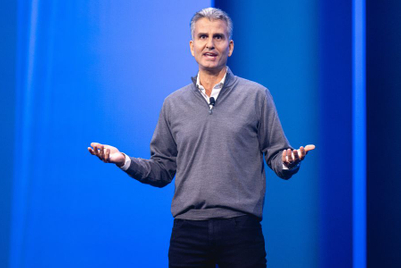
Rob Gilby is all about Disney. His office in the heart of Times Square in Hong Kong is littered with memorabilia - on a bright red sofa sits a giant Mickey Mouse. "I grew up singing Disney songs. That was my passion," he says.
The senior vice-president and managing director of media distribution at The Walt Disney Company Asia-Pacific, explains how the pioneer of animated cartoons came to be such a global success. "It lies in the way the brand resonates with multiple generations, in the way tweens connect with Disney Channels and audiences connect with movies like Toy Story 3 coming out this summer. It's been nearly a decade since the last Toy Story, yet it still resonates with audiences and the next generation of Toy Story fans are coming through."
Gilby's remit at Disney is vast. With offices in six markets in Asia-Pacific, including Beijing, Shanghai, Hong Kong, Singapore, Sydney, Seoul and Mumbai, the organisation distributes Disney's media portfolio to broadcasters and platforms in the region, including free-to-air and paid for platforms, satellite, cable, online and mobile. The content includes Disney films, TV series such as ABC's Lost, Desperate Housewives and Grey's Anatomy, and Disney Channels including Playhouse Disney and Disney XD.
Gilby says Asia-Pacific is now Disney's highest growth region because the consumer appetite for media is growing so rapidly. "It's an amazing portfolio and a lot of customers. With the emergence of technology - digitisation of cable or telecom companies moving into content, as well as mobile - Disney needed a way of speaking to all these partners with one voice," he explains.
And this is what the energetic Gilby says sets Disney apart from its competition in the region - from the likes of Warner Brothers and Twentieth Century Fox who have also seen growth. "We have theme parks, a film studio, TV channels, movies. Nobody else has as strong a potential to take a story and a character across all parts of the business," he says.
Gilby actually comes from a family of scientists, but chose a different path. "I took the marketing and entertainment route," he says. "And I fell in love with it."
He started out at PricewaterhouseCoopers in London as an accountant. Gilby later cut his teeth in the firm's entertainment and media group, which he was heavily involved in launching. He then moved to Turner Entertainment in Hong Kong and then to Disney back in London. "In 2008 I came back to Hong Kong again to head Disney's media distribution unit," he says. "My friends now call me a Hong Kong lifer."
In Asia-Pacific, Gilby's key drive is local content and he believes it is this that will secure the company's success in the region. He explains how Disney's global programming still resonates with a large number of audiences across Asia. "But this has to go a layer deeper in the relevance and the relationship," he explains. "Exploring local content opportunities is a key priority for us and the first step is usually to consider formats such as a scripted series that you can make a local version of, or non-scripted, like a games show or a reality show."
Disney's focus markets in the region are varied. Australia, as a developed and mature market, has a strong demand for Disney's US programming. The two large growth markets are India and China and local content, as well as local partnerships, have become essential to success.
"We've already made a movie in India called Roadside Romeo; in China we've made The Secret of the Magic Gourd and Touch of the Panda," Gilby explains. "We're in the process of launching a Chinese adaptation of High School Musical and an animated series."
In China, Disney primarily partners with CCTV, as well as emerging provincial media groups such as Shanghai Media Group. "These provincial channels are really presenting a lot of opportunity in terms of local content," Gilby says. "We are launching a Chinese version of The Amazing Race, in partnership with Shanghai Media Group called The Amazing Race, China Rush."
India too is presenting itself as a vibrant TV market. "With more than 500 paid television channels, India has a dynamic advertising industry and a dynamic TV and film production industry. As well as adopting a country-wide strategy, Southern India is emerging as a key growth opportunity for Disney - here we've formed a distribution partnership with Sun TV," he says.
Other key emerging markets for Disney include Indonesia and Korea. "Indonesia is particularly interesting at the moment - it has more kids than the entire UK population, which gives us a huge audience in terms of our kids and family content," Gilby says. "Korea is the most digitally connected market anywhere in the world. The broadband speeds are incredible. You can download a movie in three minutes."
Piracy remains an industry-wide issue on a local and global scale that impounds the success of companies like Disney. However, to counter this Gilby says the company has successfully invested in well-timed, well-priced digital media alternatives. It is also working with governments to put in place protection for intellectual property and on education for consumers, so they understand the impact of and risk associated with piracy.
"Just look at the tweens," Gilby says. "They should be the ones swiping this stuff off the internet, but instead they're nagging their parents to buy the DVDs."
This article was originally published in the 17 June 2010 issue of Media.



.jpg&h=334&w=500&q=100&v=20250320&c=1)

.jpg&h=334&w=500&q=100&v=20250320&c=1)
.jpg&h=334&w=500&q=100&v=20250320&c=1)
.jpeg&h=334&w=500&q=100&v=20250320&c=1)

.jpg&h=334&w=500&q=100&v=20250320&c=1)

.jpg&h=334&w=500&q=100&v=20250320&c=1)

.jpg&h=268&w=401&q=100&v=20250320&c=1)



.jpg&h=268&w=401&q=100&v=20250320&c=1)
.jpg&h=268&w=401&q=100&v=20250320&c=1)
.jpg&h=268&w=401&q=100&v=20250320&c=1)